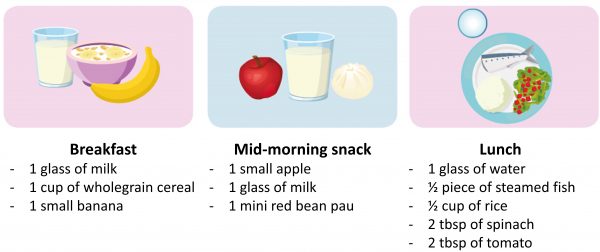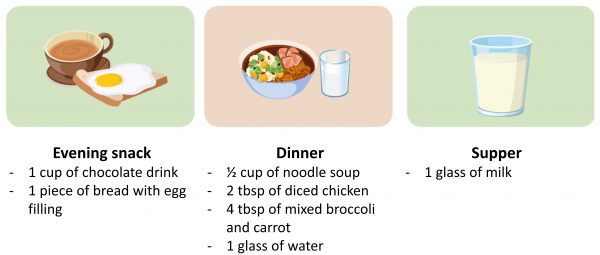Modern parents are busy with work and chores at home and office, and their children are sent to nurseries or babysitters during the day. Thus, it can be tough for parents to monitor what their children eat, or if they receive proper nutrition and practise good eating habits.
Poor eating habits
Young children and pre- schoolers are at a rapid phase of growth and development, and need to receive sufficient nutrition for optimal growth. Some nurseries or babysitters serve easy-to-eat and convenient foods, which may lack certain nutrients. Sometimes, you may have to opt for outside food (which you have no control on the nutritional value) for your family’s dinner after a busy day at the office. And if your child is a picky eater, he may be missing out on some important nutrients needed for his growth. Over time, these poor eating habits may cause an imbalanced intake of energy and nutrients, thus affecting your children’s growth and development, possibly leading to malnutrition (e.g. overweight or underweight). Therefore, parents need to make time to nurture healthy eating habits in the family.
Develop healthy eating habits from young
It is important that basic principles of healthy eating are observed to develop healthy habits from young.
- Ensure diet is balanced with all foods from the five food groups, as this will help your child’s body gets all the nutrients needed.
- Serve foods in appropriate and moderate amounts to avoid over- or under-consumption of each food.
- Provide variety of food choices within each food group during meal times throughout the day as different foods provide different nutrients (e.g. protein variety – breakfast: milk; lunch: fish; dinner: chicken).
- Serve 3 regular healthy main meals, and provide 1-2 servings of healthy snacks between meals when necessary.
- Provide more fruits and vegetables and whole grains, and ensure your child gets milk daily.
An example of a balanced healthy meal plan for your child:


(Reference: Garis Panduan Menu di Pusat Jagaan, Nutrition Division MOH & Department of Social Welfare Malaysia)
Smart tips to ensure healthy eating is practised
Tips to incorporate healthier eating options for the children (and family) whenever possible:
Shop smart: Prepare a shopping list to save time and avoid buying unnecessary things. If you know your child needs more of certain nutrients like iron, ensure you buy milk or meat. Compare nutritional values of different packaged foods to know how much each product provides. Opt for the one higher in fibre, vitamins and minerals, but watch out for fat, sodium and sugar content.
Plan in advance: Look at your schedule for time to cook, and plan nutritious meals on a weekly basis. Prepare the ingredients in advance during the weekends. You can also pre-cook meals, freeze in batches, and reheat at mealtimes.
Quick and easy recipes: Save time with one-pot meal recipes or all- in-one dishes, like pasta with diced meat & mix veggies, that contains all food groups in a dish. Some supermarkets also have ready-to-cook foods, with pre-packed ingredients, which can be incorporated as part of your healthy meals.
Nutritious take-outs: Choose more nutritious options when eating outside or ordering take-outs. Have steamed fish instead of fried chicken, more veggies and less rice, and milk or fresh juice instead of soda. Also request for less salt, sugar and fat in the preparation of dishes, if possible.
Bring food from home: Prepare healthy lunchboxes with appropriate portions for your child to bring to the nursery/day-care centre. Instruct the baby sitter to ensure your child eats on time and encourage him to finish it to meet his nutritional requirement.
In case of picky eating: Be creative with colours, design and arrangement when preparing your child’s food. For extreme picky eaters, consult a nutritionist or paediatrician to work out a tailored meal plan for your child so that he gets optimum nutrition for his growth and development.
By following these tips and ideas, your child will receive proper nutrition and develop good eating habits. Give more focus to the nutritional needs of young children during this important rapid growing phase. Balance, moderation and variety in their meals are key for their optimal growth and development.
An educational collaboration with Nutrition Society of Malaysia.






Comments